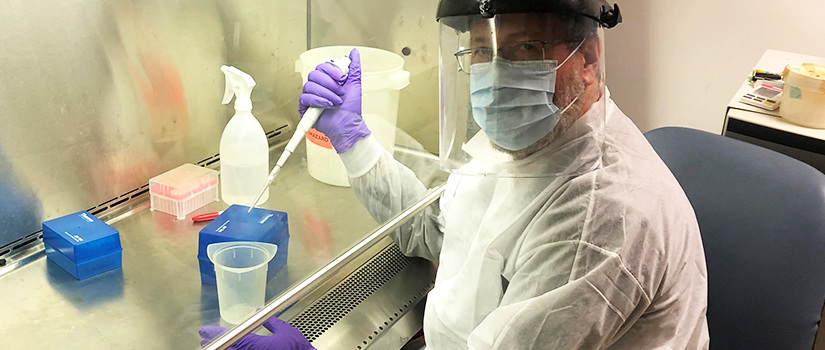Shtutman’s research group conducts testing, generates data on COVID-19
When the COVID-19 pandemic was declared in March of this year, testing was not readily available due to a shortage of equipment and expertise. Michael Shtutman, associate professor and director of the Functional Genomics Core at the University of South Carolina College of Pharmacy, volunteered his team’s services. The team includes Diego Altomare, core manager and associate professor, and Hao Emily Ji, manager and bioinformatician.
We asked Shtutman to tell us about the significance of their work:
Q: Tell us more about the work being done with COVID-19.
Shtutman: The Functional Genomics Core is an academic research core and not a medical diagnostic facility, but we had the necessary equipment and expertise to conduct COVID-19 testing. We volunteered our services and equipment usage and began working with Prisma Health to set up and carry out COVID-19 testing as a research study. FGC has conducted COVID-19 testing of Prisma Health professionals and employees of UofSC and their families, at no cost, carrying out more than 3,500 tests.
In addition to testing for COVID-19 infection, FGC began sequencing of the virus genome in different test samples. This analysis throws light on the route of transmission and virus mutations that occur in our state’s population; such mutations may affect the infection rate and severity of the disease.
Q: How might studying genetic variances among COVID-19 patients make a difference in how health professionals can better understand the disease and the overall treatment and care of patients?
Shtutman: There is accumulating evidence that genetic variations in the human or viral genomes affect the severity of the disease. We are generating the data on genetic variations, which health professionals correlate with the severity of the disease. Much less is known about individual variability in the response to the treatments for COVID-19, but we hope that our study will help to identify patients who will respond better or worse to specific treatments.
Q: How has COBRE Center for Targeted Therapeutics supported the research you are doing?
Shtutman: Without the COBRE Center for Targeted Therapeutics (CTT) there would have been no infrastructure to fight COVID-19 at UofSC. The CTT efforts to create genomics capacities at UofSC have provided all necessary infrastructure and expertise. CTT also provided a grant to support the development of a safe cell culture system to test different drugs for efficacy against SARS-CoV-2, without having to use BSL-3 facilities, none of which are currently available in South Carolina. In collaboration with a group of computer scientists led by Dr. Ilya Safro at Clemson University, we are working to find a new Artificial Intelligence approach to identify drugs that may be efficient against COVID-19.
Q: What is the end goal of your research?
Shtutman: Our goal is to find a way to stop the spread of SARS-CoV-2.
